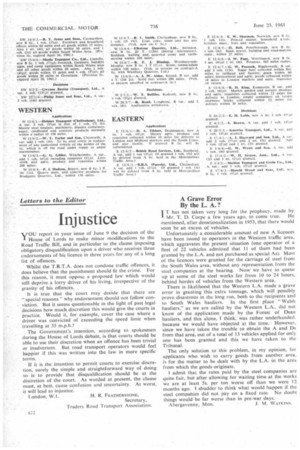Injustice
Page 66

If you've noticed an error in this article please click here to report it so we can fix it.
VOU report in your issue of June 9 the decision of the I House of Lords to make minor modifications to the Road Traffic Bill, and in particular to the clause imposing obligatory disqualification upon a driver who receives three endorsements of his licence in three years for any of a long list of offences.
Whilst the T.R.T.A. does not condone traffic offences, it does believe that the punishment should fit the crime. For this reason, it must oppose a proposed law which would still deprive a lorry driver of his living, irrespective of the gravity of his offences.
It is true that the court may decide that there are " special reasons" why endorsement should not follow conviction. But it seems questionable in the light of past legal decisions how much discretion this would give the courts in practice. Would it, for example, cover the case where a driver was convicted of exceeding the speed limit when travelling at 35 m.p.h.?
The Government's. intention, according to spokesmen during the House of Lords debate, is that courts should be able to use their discretion when an offence has been trivial or inadvertent. But road transport operators would feel happier if this was written into the law in more specific terms.
If it is the intention to permit courts to exercise discretion, surely the simple and straightforward way of doing so is to provide that disqualification should be at the discretion of the court. As worded at present, the clause must, at best, cause confusion and uncertainty. At worst, it will lead to injustice.
London, W.I. H. R. FEATHERSTONE,
Secretary, Traders Road Transport Association.
A Grave Error By the L. A.?
T has not taken very long for the prophecy. made by I Mr. T. D. Corpe a few years ago, to come true. He mentioned, after denationalization in 1953, that there would soon be an excess of vehicles.
Unfortunately a considerable amount of new A licences have been issued to operators in the Western traffic area, which aggravates the present situation (one operator of a fleet of 22 vehicles admitted that 11 of them had been granted by the L.A. and not purchased as special As). Most of the licences were granted for the carriage of steel from the South Wales area, without any representation from the steel companies at the hearing. Now we have to queue up at some of the steel works for from 10 to 24 hours, behind hordes of vehicles from the Western area.
There is likelihood that the Western L.A. made a grave error in granting this extra tonnage, which will possibly prove disastrous in the long run, both to the recipients and to South Wales hauliers. In the first place "Welsh hauliers," as we are called by the Western L.A., did not know of the application made by the Forest of Dean hauliers, and this alone, I think, was rather underhanded. because we would have objected at the time. However, since we have taken the trouble to obtain the A and Ds from that area, out of a total of 13 vehicles applied for only one has been granted and this we have taken to the Tribunal.
The only solution to' this problem, in my opinion, foi applicants who wish to carry goods from another area, is for the matter to be dealt with by the L.A. in the area from which the goods originate.
I admit that the rates paid by the steel companies arc quite fair, but after allowing for waiting time at the works we are at least 55. per ton worse off than we were 12 months ago. I shudder to think what would happen if the steel companies did not pay on a fixed rate. No doubt things would be far worse than in pre-war days.
Abergavenny, Mon. J. M. WATKINS.




















































































































